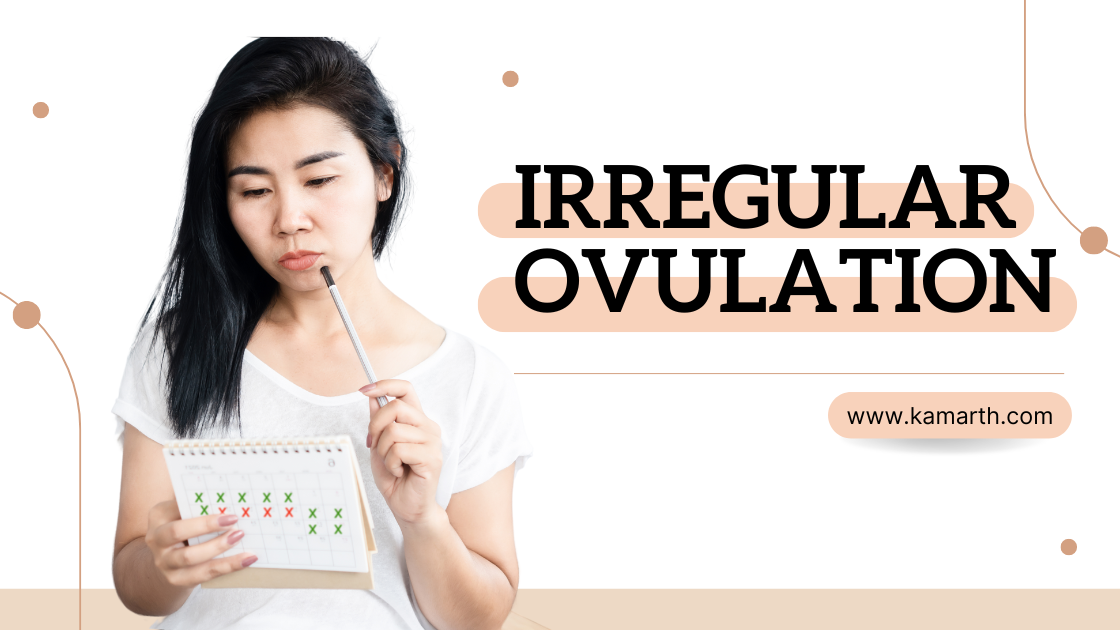Irregular Ovulation – Irregular Ovulation may be the root cause of infertility. It means that you are not ovulating or not capable of releasing an egg. It is usually brought on by abnormalities in the hormonal system, and the chief symptom is usually bleeding from the vagina at irregular times. Healthcare professionals treat anovulation by using medication and/or lifestyle modification to help balance your hormones. For a better understanding of irregular ovulation, read through the whole article.
Table of Contents
What is Irregular Ovulation?
Irregular Ovulation, also known as irregular menstrual cycles or Anovulation, can occur due to various factors affecting the hormonal balance and reproductive system in women. It can be caused due to some reasons:
- Hormonal Imbalances: High imbalances in different hormones such as estrogen, progesterone, luteinizing hormone (LH), and follicle-stimulating hormone (FSH).
- Polycystic Ovary Syndrome (PCOS): it is nowadays a common hormonal issue, found in women, which can cause irregular menstruation.
- Thyroid Disorders: Thyroidism can be a reason in women, for irregular periods.
- Stress: High levels of stress can impact hormone production and ovulation.
- Weight Fluctuations: Significant weight changes, either weight gain or loss, can affect hormonal balance.
Read More – Endometriosis: Stages, Causes, Symptoms, Diagnosis
Symptoms
You can identify the telltale signs & symptoms of anovulation by monitoring your monthly cycles and knowing general signs of ovulation. First of all, remember that having a period does not mean you have ovulated.
Irregular Ovulation symptoms and signs might include:
- Irregular or absent menstrual cycles.
- Changes in menstrual flow.
- Difficulty conceiving.
Symptoms related to underlying conditions like PCOS
- Acne
- Excessive hair growth
Read More – Teenage Marriage – Cause, Implication, Why should it stop?
Diagnosis & Treatment
Characteristically, it is diagnosed by history of menstruation and hormonal tests, like LH and FSH levels, and sometimes ultrasound.
Treating anovulation means addressing, if possible, the underlying hormonal imbalance that causes this problem. Generally speaking, the following life style modifications may help improve your anovulation:
- Lifestyle Changes: Managing stress, maintaining a healthy weight, and regular exercise.
- Medications:
- Hormonal treatments to induce ovulation (e.g., clomiphene citrate).
- Management of underlying conditions (e.g., thyroid medication for thyroid disorders).
Read More – Intrauterine Device (IUD) – Birth Control, How it works,
Impact on fertility
Irregular ovulation can make conception challenging but is often treatable with medical intervention and lifestyle adjustments. Managing irregular ovulation requires a personalized approach based on the underlying cause and individual health factors. Regular monitoring and consultation with a healthcare provider are essential for effective management and fertility planning.
Read More – Egg Freezing : Breaking Barriers or Evolution of Family Planning
What is the recommended frequency of intercourse for couples trying to conceive?
The frequency of intercourse can play a major role in maximizing the chances of pregnancy. Some generally recommended tips are:
- Regular Intercourse: For optimal chances of conception, aim to engage in sexual intercourse every 1-2 days throughout the menstrual cycle, with a particular focus on the time of ovulation.
- Timing Around Ovulation: The most fertile period occurs around ovulation, which generally happens midway through the menstrual cycle. Having intercourse during this time maximizes the likelihood of sperm fertilizing the egg.
- Ovulation Prediction: Use ovulation predictor kits, and fertility monitors, or track basal body temperature to help identify the fertile window and time intercourse accordingly.
- Healthy Sperm: Healthy sperm can live in the female reproductive tract for up to 5 days, so having sex in the days leading up to ovulation can also be beneficial.
Overall, consistency in sexual activity throughout the menstrual cycle, focusing more intensely on ovulation, increases the likelihood of conception. Also, the Intrauterine insemination or IUI process can work for those who are facing trouble to conceive naturally.
If you don’t want to conceive
- Use birth control
- Practice safe and protected sex
- Keep track of your menstrual cycle
- Some permanent processes, like surgery and blocking of the fallopian tube, can also work.
Read More – Non Hormonal Birth Control Pills – How it work, How to Use
Conclusion
Medical interventions and the patient’s lifestyle changes improve his or her chances of conceiving, especially due to hormonal imbalances or PCOS that affect ovulation. Continuing consultation and proper management play a key role in attaining conception goals and reproductive health.
Read More – Emergency Contraceptive Pills – Unwanted 72, When to take
Some Additional Doubts
Question: Can I get pregnant if I have irregular periods or irregular ovulation?
Answer: Yes, but irregular ovulation can make conception more challenging. Medical intervention and tracking methods can help optimize timing.
Question: What lifestyle factors can affect ovulation?
Answer: Factors such as stress, weight fluctuations, excessive exercise, and certain medical conditions (like polycystic ovary syndrome) can impact ovulation.
Question: How long does an egg remain viable after ovulation?
Answer: An egg remains viable for about 12-24 hours after ovulation, during which it can be fertilized by sperm.
Question: When should I seek medical advice if I’m having trouble conceiving?
Answer: If you’ve been actively trying to conceive for a year (or six months if you’re over 35) without success, consider consulting a healthcare provider for further evaluation and guidance.
Question: How do you know when you ovulate with irregular periods?
Answer: Store-bought ovulation test kits, fertility charts, and basal temperature can also be employed to predict the reproductive periods of a woman. In cases where a lady has irregular periods, these are helpful. You can insert a date in the calculator that is past the ovulation date, so kindly be aware of that.
Related Articles
Is Masturbation good or bad? – Benefits, Addiction, Disadvantage
Porn Addiction – Is it real?, Causes, Signs, Harmful, Beneficial
Do girls masturbate?
Understanding Miscarriage – Critical Prevention, 05 way to Diagnosis, and Effective Treatment
07 Common Causes of Sexual Performance Anxiety and How to Overcome It Fast
Reference Link
https://www.healthline.com/health/womens-health/what-is-ovulation
https://www.webmd.com/infertility-and-reproduction/irregular-periods-and-getting-pregnant
https://www.researchgate.net/publication/248868070_Regular_and_irregular_characteristics_of_ovulation_and_interovulatory_intervals_in_mares
https://my.clevelandclinic.org/health/diseases/21698-anovulation
